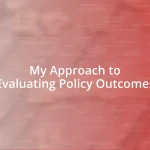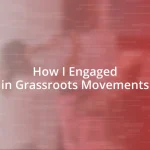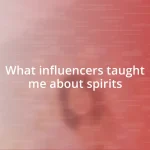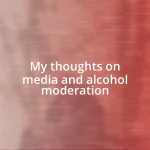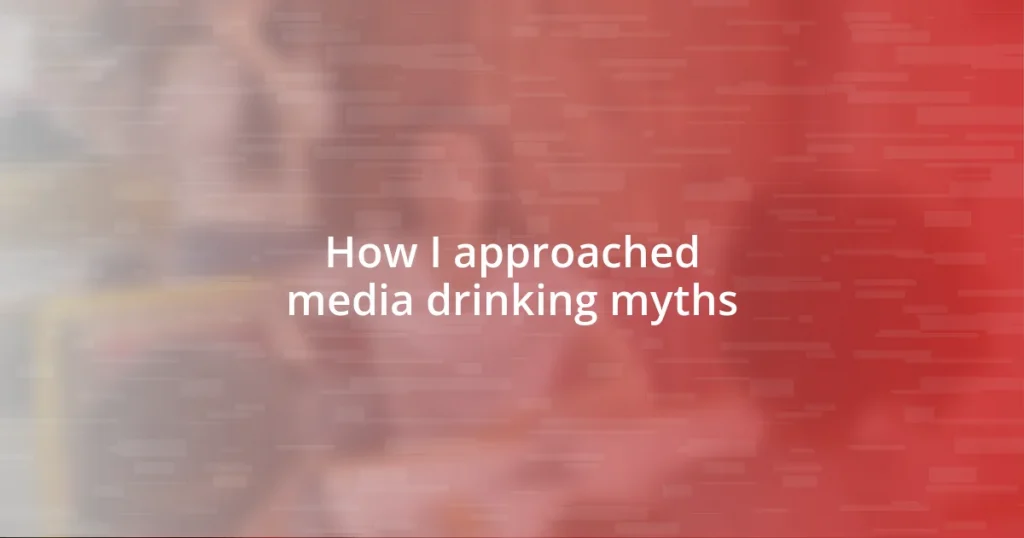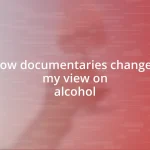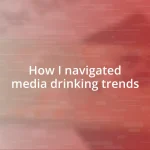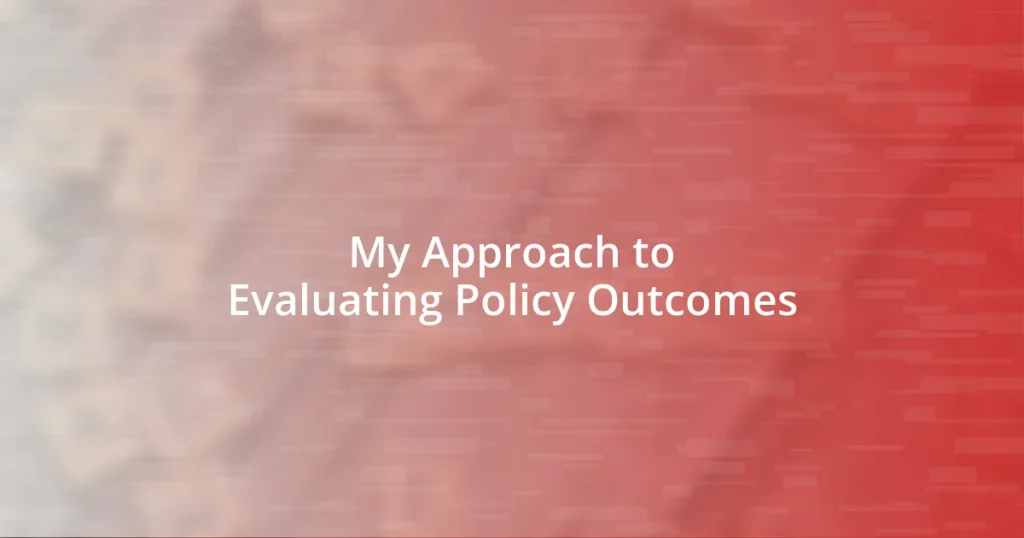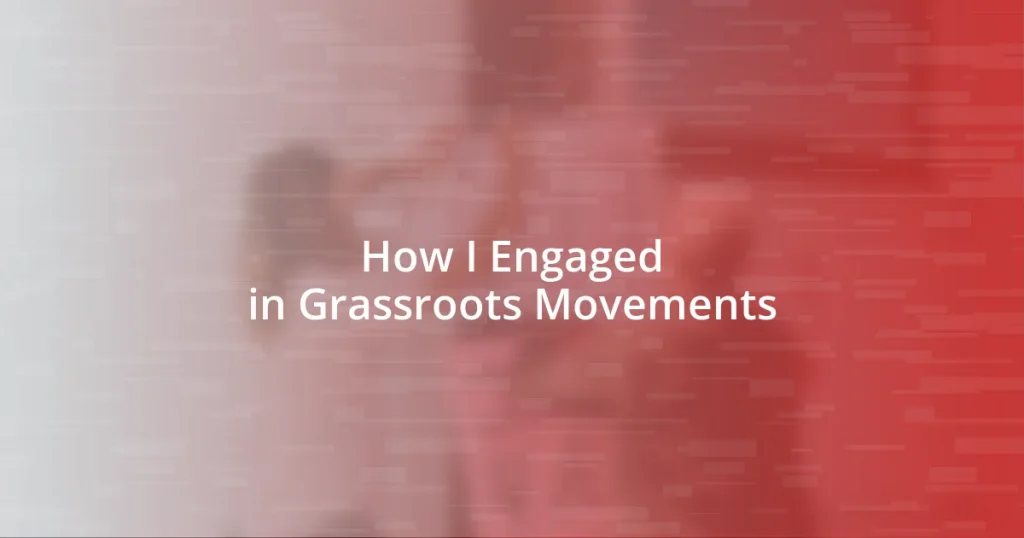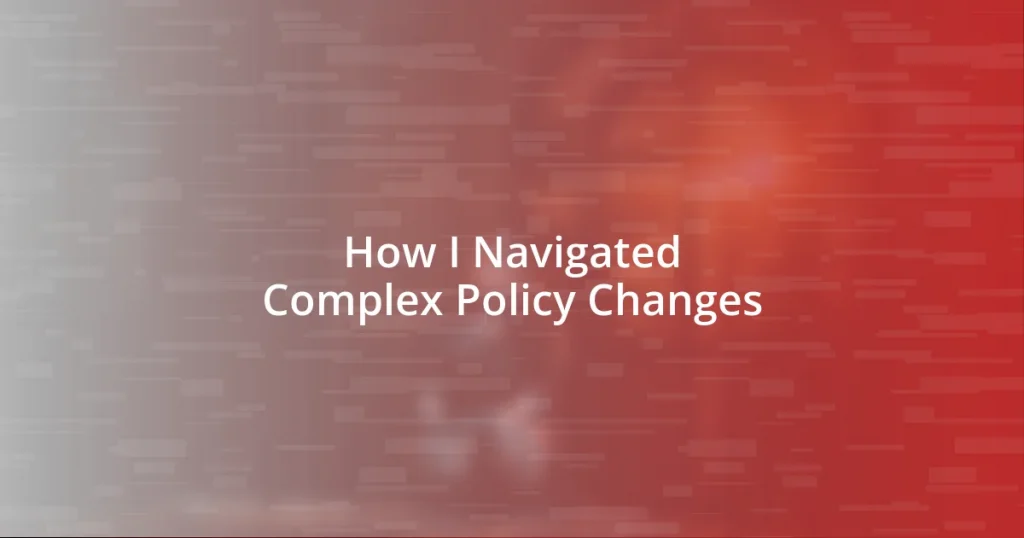Key takeaways:
- Media often glamorizes alcohol, leading to misconceptions that equate drinking with fun and socializing, which can pressure individuals to conform.
- Personal experiences reveal that enjoyment and connection can thrive without alcohol, challenging societal norms around drinking at social events.
- Promoting a healthy drinking culture involves open conversations, valuing moderation, and focusing on alternative activities that foster genuine connections.
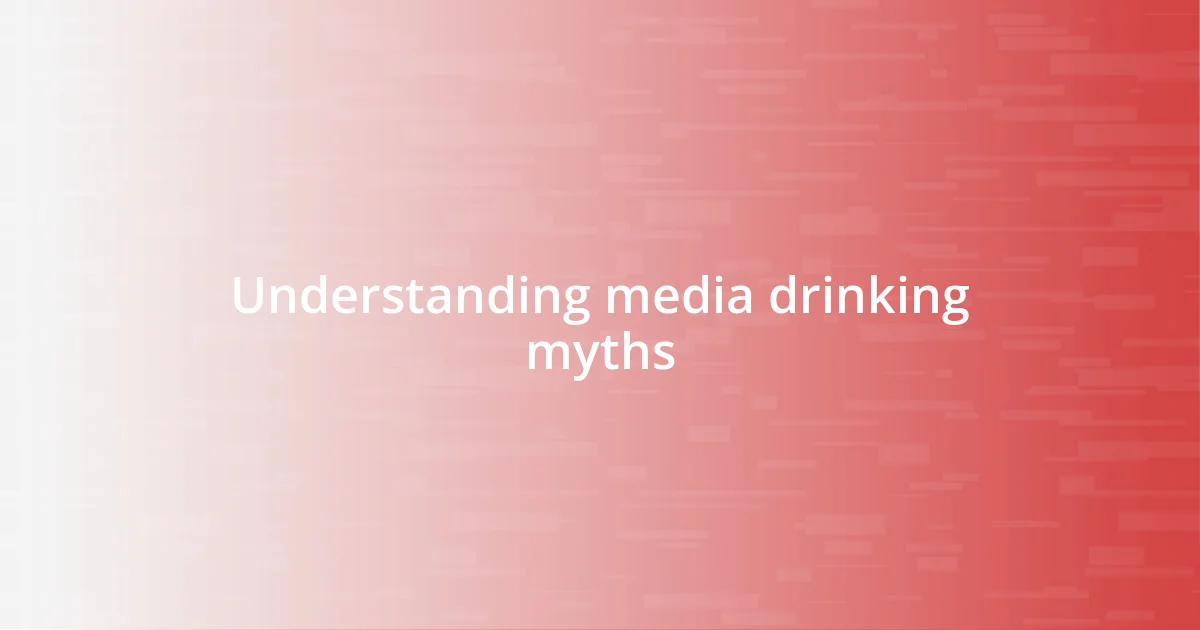
Understanding media drinking myths
Understanding media drinking myths can sometimes feel disorienting. I remember the first time I saw a popular movie portraying college life with endless parties and carefree binge drinking. It made me wonder: do we really think that’s how most students live? The truth is, while these portrayals can be fun, they often exaggerate reality and lead to misconceptions about drinking behaviors.
Many of us have fallen prey to the idea that drinking is an essential part of socializing. I can recall attending a gathering where everyone seemed to have a drink in hand. It was easy to feel like an outsider for choosing a non-alcoholic option. This pressure is rooted in the media’s messaging, which often suggests that fun and friendship are synonymous with alcohol. Recognizing this myth was a pivotal moment for me; I realized that true connection doesn’t require a drink.
It’s essential to critically examine the influence of media on our perceptions of drinking. Have you noticed how often alcohol is glamorized in commercials and social media? Those images can create unrealistic expectations, making it hard to distinguish reality from fiction. By understanding the myths surrounding media portrayals of drinking, we can carve out our own narratives and redefine what “having a good time” means for us.
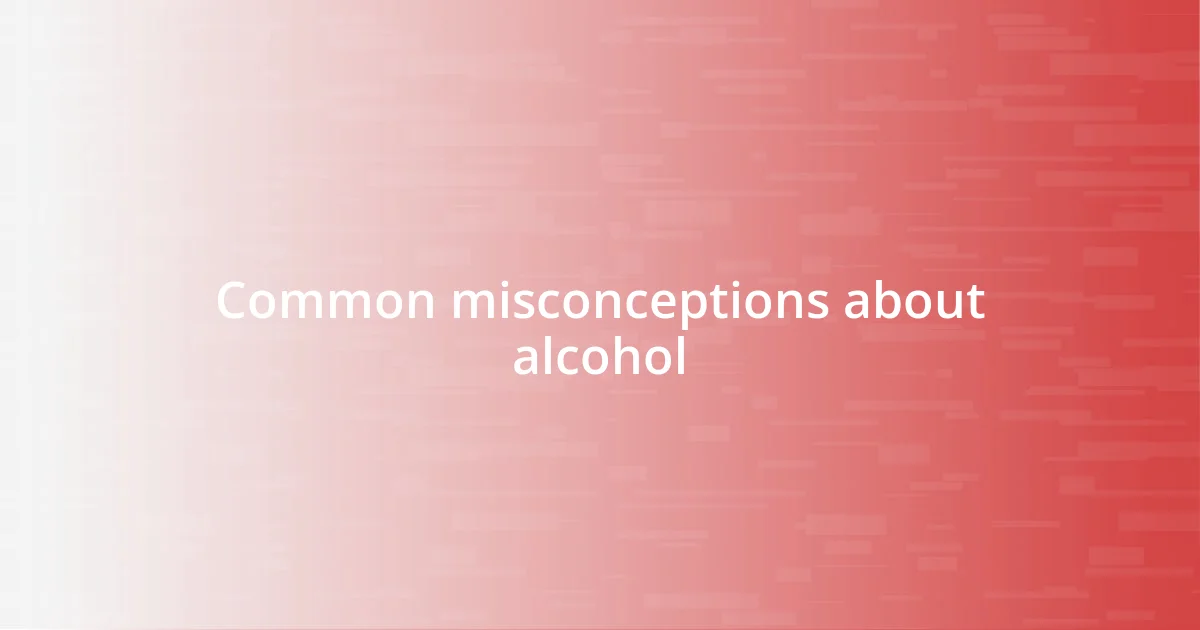
Common misconceptions about alcohol
Misconceptions about alcohol often cloud our understanding of its role in social settings. One significant myth is the belief that drinking heavily is synonymous with having fun. I remember a friend’s birthday party where the atmosphere shifted dramatically once the drinks started flowing. Those who chose to abstain were subtly excluded from the revelry. This experience reinforced my understanding that revelry doesn’t need to revolve around alcohol.
Here are some common misconceptions that I’ve encountered:
- Alcohol enhances social skills: Many believe that drinking helps them become more sociable, but it often leads to impaired judgment and social awkwardness.
- Drinking is a rite of passage: Society often glamorizes alcohol consumption as a necessary step into adulthood, perpetuating pressure among young people.
- Non-drinkers are party poopers: I’ve often felt this unspoken stigma, but it’s vital to recognize that enjoying oneself isn’t tied to whether you’re drinking or not.
- Everyone drinks: Despite what media portrayals suggest, a significant number of people choose to abstain from alcohol altogether for various reasons, including health and personal preference.
Understanding these myths can empower us to create our own definitions of enjoyment, free from external pressures.
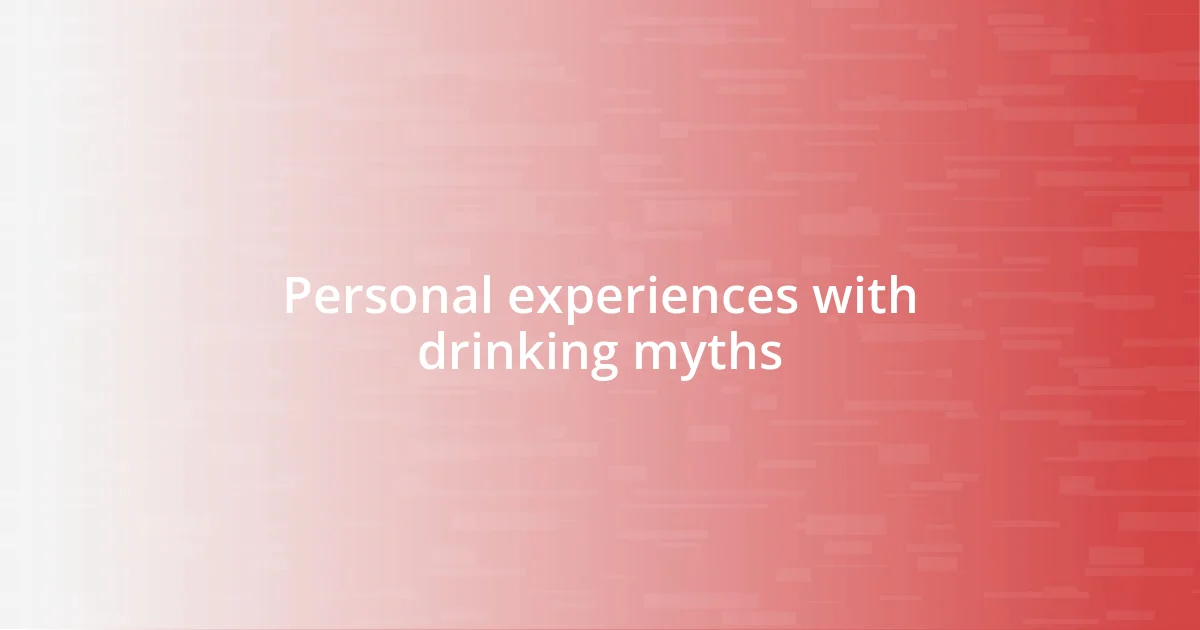
Personal experiences with drinking myths
While exploring drinking myths, I’ve had moments that made me question what I thought I knew. I went to a friend’s wedding where the open bar was the centerpiece. People were raising their glasses and toasting, but I noticed that a few guests chose to sip on sparkling water and still enjoyed themselves thoroughly. That night taught me that joy doesn’t require alcohol. It made me realize that laughter and connection can exist irrespective of what’s in our cups.
One time, I was invited to a casual get-together, and I remember feeling a pang of anxiety as I walked in with my favorite mocktail. I overheard someone mention that my choice might be a “buzzkill,” and it stung. In that moment, I felt the weight of societal expectations pressing down on me. But what surprised me was how several guests actually admired my choice, and we ended up having a great conversation about the joys of choosing alternatives to alcohol. It reaffirmed my belief that the pressure to drink often stems from a misunderstanding of what makes a gathering enjoyable.
Reflecting on these experiences, I’ve come to embrace the idea that embracing alternatives can spark genuine connections. It’s liberating to break away from the myth that alcohol is necessary for fun. I’ve since sought out friendships and events that celebrate that ethos, and I could not be happier. Conversations with my friends now often revolve around exploring new non-alcoholic drinks, making it a fun bonding experience in itself.
| Myth | Personal Experience |
|---|---|
| Drinking enhances social skills | At a party, I noticed how many people were slurring their words and struggling to engage in conversations. |
| Non-drinkers are party poopers | I felt judged for not drinking, but others eventually expressed their respect for my choice. |
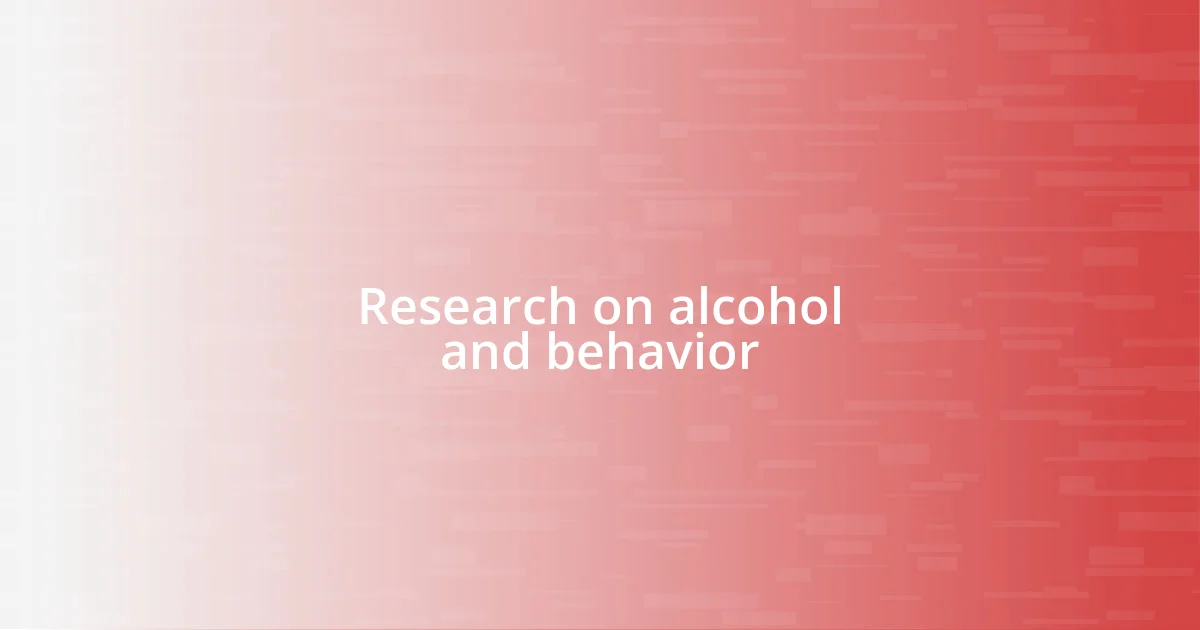
Research on alcohol and behavior
Research demonstrates that alcohol consumption can heavily influence behavior, often in ways we don’t expect. For instance, I recall reading about studies showing that individuals who drink tend to experience reduced self-control, which can lead to reckless decisions. This insight shed light on why I’ve sometimes seen friends act out of character after a few drinks; it’s not just the alcohol—it’s the way it alters their decision-making abilities.
Interestingly, when I encountered research linking alcohol to aggression, it surprised me. I had always thought of alcohol as a social lubricant, but studies reveal that it can also escalate conflicts. This makes me wonder: how many times have we witnessed a friendly gathering turn sour because someone misinterpreted a joke after a couple of drinks? These moments remind me that our perception of alcohol may not align with its actual impact on behavior.
Moreover, I found it compelling that alcohol affects each individual differently, influenced by factors like genetics and context. There was a time at a family gathering when the atmosphere shifted as a few relatives overindulged. It highlighted how one person’s reactions could ripple through the group, reminding me that choosing to drink can carry weighty consequences—not just for the drinker, but for everyone around them. Reflecting on these experiences helps me understand the intricate dynamics at play when alcohol enters the picture.
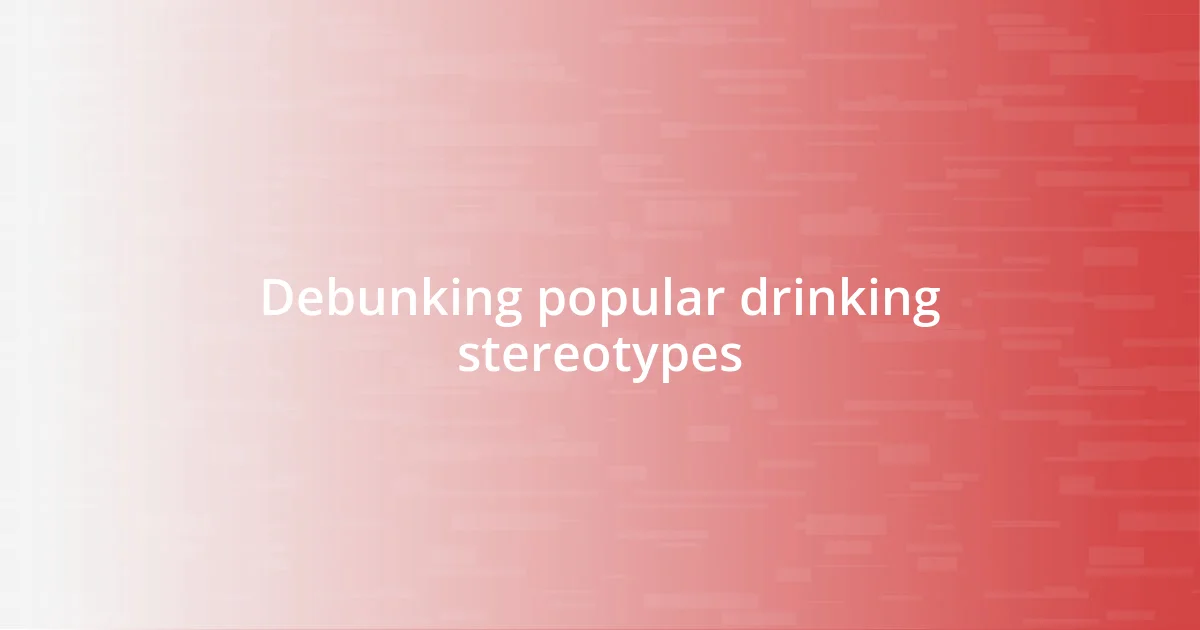
Debunking popular drinking stereotypes
At many parties I’ve attended, it always seemed like people believed the louder someone drank, the more fun they had. I remember one gathering where a friend started off sober and sociable, but as the drinks flowed, he became increasingly boisterous and unpredictable. It was eye-opening for me, realizing that the supposed ‘enhanced social skills’ alcohol supposedly provides can soon drown out genuine connection in a haze of poor decision-making. Why do we equate volume with enjoyment when, in reality, it often masks deeper insecurities?
I’ve also encountered the stereotype that non-drinkers—like me at times—are party poopers. This once hit home during a summer barbecue where, feeling left out, I stuck to my sparkling water. Yet, to my surprise, a few people gravitated toward me, sharing their own stories of cutting back on alcohol. It was a beautiful moment of connection that showed me non-drinkers can create just as much energy and enthusiasm as those who indulge. Isn’t it liberating to think that just a choice in what’s in our glasses can reshape the social narrative?
I’ll never forget a karaoke night where I opted for a non-alcoholic beer while others were knocking back shots. Instead of being sidelined, I found myself center stage, belting out my favorite tunes. This experience was a revelation; it underscored how alcohol isn’t essential for confidence or fun. Each time I reflect on that night, I ask myself—what if we all realized that enjoying ourselves doesn’t come from the bottle but from the joy of the moment?
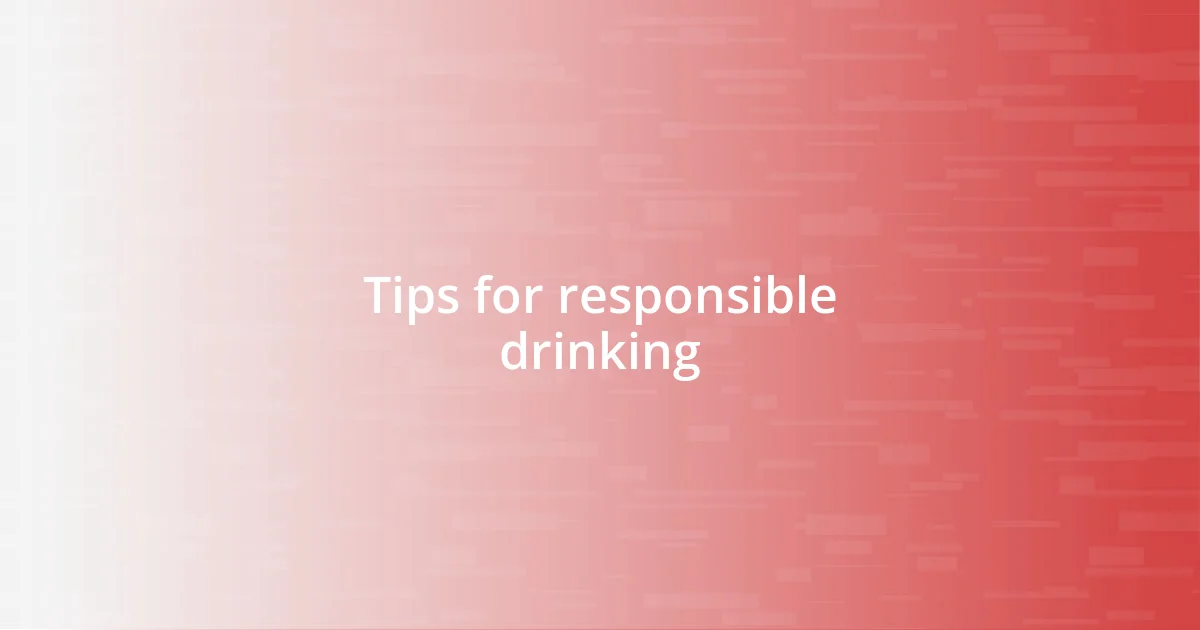
Tips for responsible drinking
I’ve found that setting limits before heading out can really transform your drinking experience. For instance, I’ve started defining a maximum number of drinks for myself whenever I attend a social event. This simple strategy not only helps me stay in control but also allows me to enjoy the evening without feeling overwhelmed. Have you ever noticed how much more you appreciate the night when you’re not nursing a hangover the next day?
Another essential tip is to stay hydrated. I’ve made it a habit to alternate my alcoholic drinks with water. I remember one memorable party where I did just that, and as the night progressed, I felt lively and present, rather than sluggish and foggy-headed. It’s amazing how much one small choice can influence how you feel. Plus, it’s a great conversation starter—people often ask me about my ‘secret’ to keeping energy up!
Lastly, I encourage you to consider the environment in which you’re drinking. At a recent backyard gathering, I realized that cozying up with a few close friends made me less inclined to overindulge. The fun of engaging in meaningful conversations outweighed any pressures to keep up with the drinking. So, could the key to responsible drinking lie in the personal connections we forge rather than the drinks we consume?
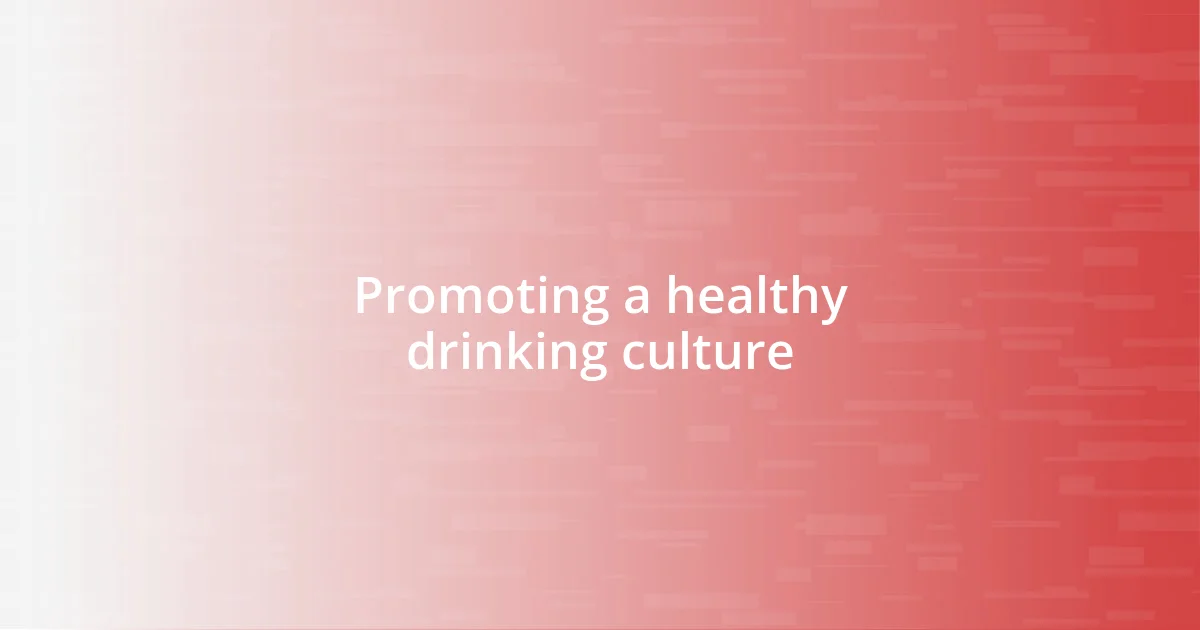
Promoting a healthy drinking culture
Fostering a healthy drinking culture starts with conversations. I remember attending an office happy hour where my team openly discussed our mixed feelings about alcohol. It felt safe to share that not everyone wanted to drink, and surprisingly, others echoed my sentiment. Isn’t it empowering when people can express their preferences without fear of judgment? This kind of dialogue can change behaviors and expectations at social events.
One evening, I chose to host a gathering where the focus was on creative mocktail-making. The laughter and collaboration that filled my kitchen formed a bond that was surprisingly more profound than if we’d been toasting with cocktails. People were genuinely engaged, supporting one another in crafting unique drinks without alcohol’s clouded influence. Isn’t it fascinating how a simple shift in activity can promote a culture of inclusivity?
I also believe it’s crucial to highlight the benefits of moderation. After attending a friend’s celebration where rich desserts and tasty non-alcoholic options were offered, I felt refreshed rather than heavy. As we gathered to share our experiences, many expressed how much more they enjoyed the evening without the fog that often accompanies excessive drinking. Have you noticed that moments of clarity often make the best memories? Creating spaces where choices are honored can truly reshape our relationship with drinking.
